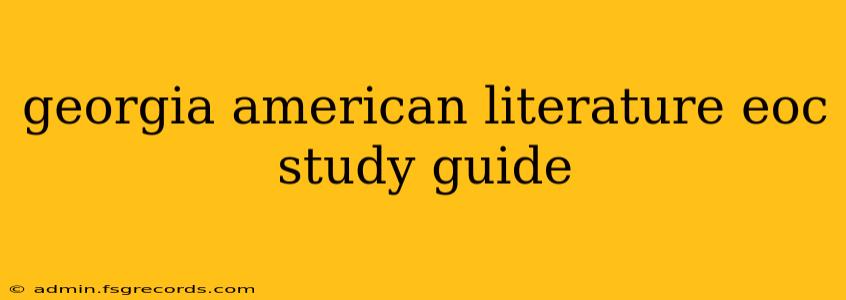The Georgia American Literature EOC (End-of-Course) exam can feel daunting, but with a structured approach and focused study, you can achieve success. This comprehensive guide breaks down key themes, authors, and literary movements to help you conquer the exam. Remember to consult your textbook, class notes, and any supplementary materials provided by your teacher for a complete understanding.
Key Literary Periods and Movements: A Foundation for Understanding
The Georgia American Literature EOC covers a vast span of time and literary styles. Understanding the historical context and defining characteristics of each period is crucial.
1. Colonial Literature (1607-1776):
- Characteristics: Often focused on religious themes, exploration, and survival narratives. Simple prose and poetry styles were common.
- Key Authors and Works: William Bradford ( Of Plymouth Plantation), Anne Bradstreet (To My Dear and Loving Husband), Jonathan Edwards (Sinners in the Hands of an Angry God).
- Themes: Religious devotion, exploration and colonization, survival, and the relationship between the individual and God.
2. American Romanticism (1800-1870):
- Characteristics: Emphasized emotion, intuition, and imagination over reason. Celebrated nature, individualism, and the supernatural. Often featured idealized heroes and settings.
- Key Authors and Works: Edgar Allan Poe (The Raven, The Tell-Tale Heart), Nathaniel Hawthorne (The Scarlet Letter), Herman Melville (Moby Dick), Walt Whitman (Leaves of Grass), Henry David Thoreau (Walden).
- Themes: Nature, individualism, imagination, the sublime, the darker side of humanity, and social reform.
3. American Realism and Naturalism (1865-1914):
- Characteristics: Focus on portraying life as it is, without idealization. Emphasis on everyday life, social issues, and the impact of environment on individuals. Naturalism added a deterministic element, suggesting that characters are controlled by forces beyond their control.
- Key Authors and Works: Mark Twain (The Adventures of Huckleberry Finn, The Adventures of Tom Sawyer), Kate Chopin (The Awakening), Stephen Crane (The Red Badge of Courage), Jack London (The Call of the Wild).
- Themes: Social class, poverty, race, gender, determinism, the impact of environment, and the challenges of everyday life.
4. Modernism (1914-1945):
- Characteristics: Broke away from traditional forms and styles. Explored themes of alienation, disillusionment, and the changing social landscape. Often experimented with stream-of-consciousness and fragmented narratives.
- Key Authors and Works: F. Scott Fitzgerald (The Great Gatsby), Ernest Hemingway (The Sun Also Rises, A Farewell to Arms), William Faulkner (The Sound and the Fury, As I Lay Dying), T.S. Eliot (The Waste Land).
- Themes: Alienation, disillusionment, the search for meaning, the impact of war, changing social values, and the loss of traditional beliefs.
5. Postmodernism (1945-Present):
- Characteristics: Challenges traditional notions of narrative, truth, and reality. Often uses metafiction, irony, and intertextuality. Experiments with language and form.
- Key Authors and Works: Consider works by authors like Toni Morrison (Beloved), John Updike (Rabbit, Run), and Don DeLillo (White Noise).
- Themes: Identity, technology, globalization, consumerism, the nature of reality, and the subjective experience.
Mastering Literary Devices and Techniques
Understanding literary devices is crucial for interpreting the texts and answering EOC questions. Familiarize yourself with:
- Figurative Language: Metaphors, similes, personification, hyperbole, etc.
- Literary Devices: Foreshadowing, symbolism, imagery, irony, alliteration, etc.
- Narrative Techniques: Point of view (first-person, third-person limited, third-person omniscient), tone, mood, setting, theme, characterization.
Practice and Preparation Strategies
- Practice Tests: Use practice tests to identify your strengths and weaknesses. Focus on the areas where you need improvement.
- Review Key Themes: Identify recurring themes across different literary periods and authors.
- Analyze Literary Devices: Practice analyzing literary devices in sample passages.
- Time Management: Practice working under timed conditions to improve your efficiency.
By systematically reviewing these key areas and dedicating sufficient time to practice, you can significantly improve your performance on the Georgia American Literature EOC exam. Remember that consistent effort and focused study are the keys to success. Good luck!

